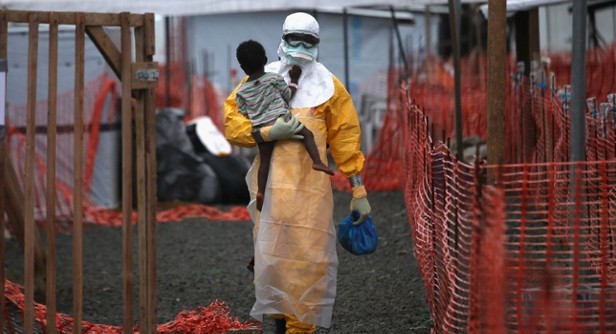
Authorities fighting Ebola must do more to reduce a high mortality rate among young children whose isolation from parents also causes great distress and deprives them of the extra care they need, the World Health Organization (WHO) said on Friday.
Reporting on a meeting of clinicians from Guinea, Liberia and Sierra Leone, the agency said there was a consensus that the strict “no touch” policy for Ebola patients could be lifted if good measures are in place to protect health workers from infection.
“There is a need to address issues around children and pregnant women. Children under five had a very high rate of mortality, this was often because need a great deal of support to be fed, to be cared for,” said WHO technical adviser Dr. Margaret Harris.
Mortality in children under five years of age has been 80 percent, meaning four out of five die, and up to 95 percent among children younger than one year, who require intensive nursing and frequent feeding, she said. The overall mortality in the current outbreak is estimated at 60 to 70 percent.
“[The high mortality rate] was often because they need a great deal of support — to be fed, to be cared for,” Harris said. “And there was quite some suggestion that simply being separated and isolated, as happens in an Ebola treatment unit, had a devastating psychological effect on children. They did not have parents, they did not have carers.”
“The complexities of dealing with children, especially children under-one, were not really being met and they need to be met,” she added.
At least 21 pregnant women have survived the haemorrhagic disease, but their babies or fetuses rarely lived through it, she said. In total, more than 9,000 people have died out of 22,525 known cases in the epidemic that began in December 2013.
Survivors have displayed symptoms including severe muscle pain, headaches, mood swings, depression, loss of concentration and impaired vision, according to the WHO. Some of the 5,000 to 10,000 survivors are still reporting side effects months after their recovery, Harris said.
“[T]here is a huge need for ongoing care of people who have recovered from Ebola. There is a need to have such people on registries, so that they can be followed up,” she said. “There is a particularly important need to follow up children who have been infected with Ebola and recovered, because we do not know whether this will have any effect on their neurological development and other development.”
The U.N. Children’s Fund reported today that 16,600 children in the three countries have lost one or both parents, leaving more than 3,600 orphaned. But communities and extended family members have taken in all but about 500 of them, overcoming initial fears and stigma, the agency said.
